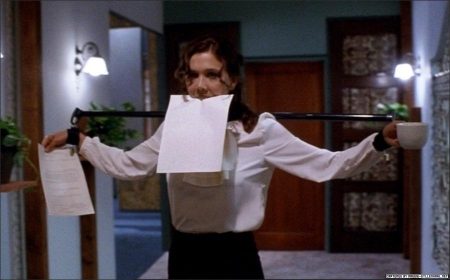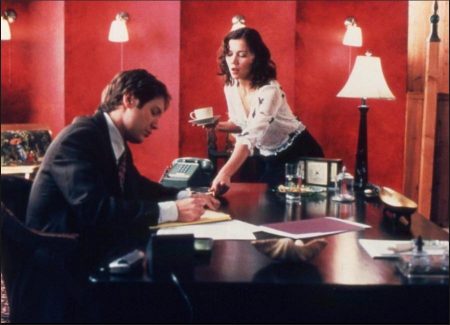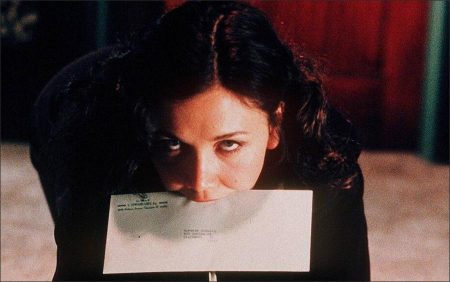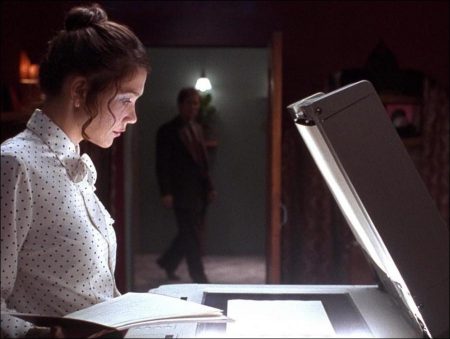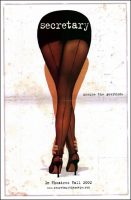Secretary, a small groundbreaking comedy, is a contemporary Cinderella story with a kink and a wink. Its endearing heroine is Lee Holloway, a repressed, masochistically inclined young secretary who blooms under the spanking hand of her boss, E. Edward Grey (James Spader), a grim, tight-lipped lawyer who presides over an office where the computer has yet to replace the trusty old typewriter.
When Lee misspells too many words in a business letter, that hand administers ritual corporal punishment in which Lee must bend over and place both hands on Edward’s desk while he gives her a spanking that leaves her flesh reddened but not welted. The role of Lee, which Maggie Gyllenhaal imbues with a restrained comic delicacy and sweetness, should make her a star. Mr. Spader, who has always specialized in slippery, fish-eyed yuppies haunted by inner demons, is ideally cast as Edward, a shy sadomasochist whose spankings are delivered with an ardent choked-up tenderness.
Lee’s secretarial job is her first employment after a stay in a mental hospital and a short stint in business school. She has a history of cutting and burning herself that has left telltale blemishes over much of her body. Fits of anxious self-loathing trigger episodes of self-mutilation. As she takes her first shaky steps into the workaday world, her overprotective mother, Joan (Lesley Ann Warren), who drives her back and forth to the office, keeps a suffocatingly vigilant watch. Those shaky steps are accompanied by a tentative romance with Peter (Jeremy Davies), a former high school classmate who is almost as fragile as she and whose parents try to rush them into marriage.
Where Peter’s groping sexual inexperience repulses Lee, her boss’s dominance sets her aflame. He becomes a kind of cruel Pygmalion whose blunt instructions on how she should dress, answer the telephone and even eat give her life a shape and direction. When he discerns her secret self-mutilation, he explains it to her as if he were peering into her soul. Before long Lee craves Edward’s spankings so intensely she begins devising tricks to spark his ire. But once he catches on to her game, he inflames her further by ignoring her increasingly outrageous provocations.
After typing letters riddled with intentional errors gets her nowhere, she resorts to desperate ploys like leaving an earthworm in a folded sheet of paper on his desk. Compounding the erotic tension of their relationship is the formality of their office pas de deux. Long after the game has begun, Edward remains ”Mr. Grey” and Lee ”Miss Holloway.”
With rare exceptions like ”The Night Porter,” cinematic sadomasochism (usually in the form of a cartoonish leather-clad dominatrix wielding a riding crop) has tended to be a visual joke shoehorned into a movie to certify its sexual hipness. But when it becomes the subject of a film, the humor vanishes, and the mood turns grim and clinical.
”Secretary” breaks that mold by remaining gently amused at its fun couple’s fantasy role playing. But even when it’s laughing, the laughter is more collaborative than derisive. Lee may be shown crawling around the floor with an envelope in her teeth, but the movie still insists on seeing her as a plucky heroine plotting her own sexual emancipation.
The movie, directed by Steven Shainberg from Erin Cressida Wilson’s screenplay, is also innovative in the way it blithely dissolves the line between realism and fantasy. A brief montage of scenes showing Lee carrying out office chores in grotesquely subservient positions may be only a fantasy, but then again it may not. The film’s refusal to say makes its deepest point: that what’s erotic to any of us originates in the mind and profoundly colors our perceptions of sexuality; in the realm of sexual excitement, fantasy is reality.
”Secretary” was adapted from a novella in Mary Gaitskill’s 1988 book of short stories, ”Bad Behavior,” and the movie’s surreal, tongue-in-cheek flavor is strikingly different from the feverish, slightly fetid emotional atmosphere of Ms. Gaitskill’s stories. Those stories typically have seedy, urban bohemian settings, and female protagonists who are desperate fantasists with masochistic tendencies. The writing is pointed and affectless, the authorial perspective at once drily emphatic and sourly disenchanted. ”Secretary,” which is set in suburbia, by contrast, feels cheery, and that’s one of its subversive charms.
Some may see ”Secretary,” which opens today in Manhattan and Los Angeles, as a slap in the face to orthodox feminist thinking, since the concept of sexual harassment doesn’t seem to occur to anybody. And isn’t the very term secretary passé, superseded during the last decade by the less gender-specific assistant? The movie seems to think that the traditionally sexist office climate in which a male boss routinely refers to his female assistant as ”my girl” is still the rule in business.
But for those who insist on focusing on the movie’s sexual politics, it could also be seen as a stylized critique of power and submission in the workplace and its inescapably erotic subtext. The traditional boss-secretary relationship, after all, is often as intimate as a marriage, because it involves eight-hour-a-day interaction and the keeping of volatile secrets that remain in the office and are known only to two people.
I prefer to see ”Secretary” as a wacky new-wave romantic comedy in which two lonely people locked inside their private fantasies discover a miraculous erotic harmony. In today’s post-Freudian, do-your-own-thing era of free sexual expression, the movie stands to be a wholesome self-help fable about the unlocking of shame and its magical transformation into pleasure and personal liberation. So what if its vision is finally too good to be true?
Secretary (2002)
Directed by: Steven Shainberg
Starring: James Spader, Maggie Gyllenhaal, Jeremy Davies, Patrick Bauchau, Stephen McHattie, Jessica Tuck, Amy Locane, Mary Joy, Michael Mantell, Sabrina Grdevich, Julene Renee
Screenplay by: Erin Cressida Wilson & Mary Gaitskill
Production Design by: Amy Danger
Cinematography by: Steven Fierberg
Costume Design by: Marjorie Bowers, Harold R. Brown
Set Decoration by: Michael Baker, Michael Murray
Art Direction by: Nick Ralbovsky
Makeup Department: Raqueli Dahan, Robert Hall
Music by: Angelo Badalamenti
MPAA Rating: R for strong sexuality, some nudity, depiction of behavioral disorders, and language.
Distributed byu: Lionsgate Films
Release Date: September 20, 2002
Views: 1224
